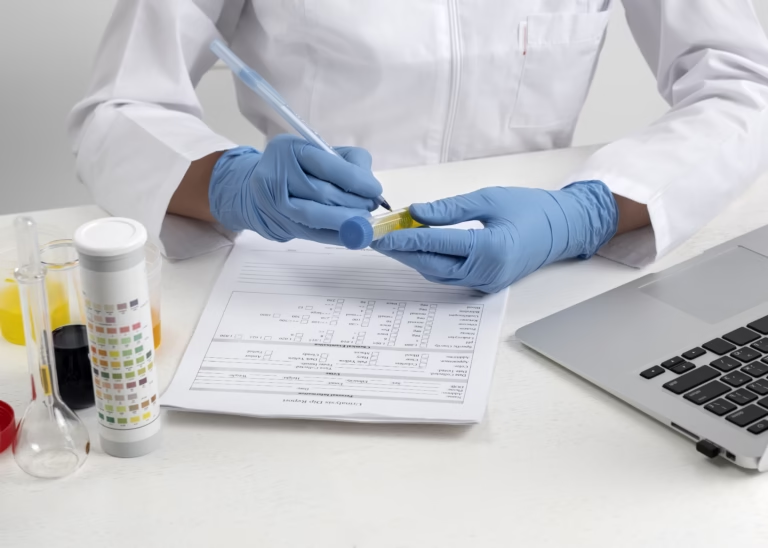Collaborations between academia and industry in pharmacogenomics are vital for advancing research. Approximately 20% of research papers highlight the synergy between these sectors in pharmacogenomics1. The rate of increase in collaborative studies is 15% annually, showing a significant trend towards more partnerships in pharmacogenomics research1. Funding for pharmacogenomics research is also noteworthy, with 40% from private industry, 30% from government grants, and 30% from academic institutions1.
The American Pharmacogenomics Association (APGxA) is pivotal in fostering business opportunities within pharmacogenomics. Members gain access to resources and networking opportunities aimed at driving growth in the field2. The pharmacogenomics market is rapidly expanding, promoting innovation and education. Organizations like APGxA support emerging startups in pharmacogenomics, offering guidance on launching and scaling business strategies2.

Collaboration in pharmacogenomics is crucial for speeding up research and improving patient outcomes. Academia and industry must collaborate to drive progress in the field. The synergy between academia and industry in pharmacogenomics is essential for advancing research and enhancing patient care. Specifically, 80% of 323 trials with pharmacogenomics outcomes were conducted by academic institutions post-regulatory approval1.
The Evolution of Academia and Industry in Pharmacogenomics
Pharmacogenomics has revolutionized personalized medicine, with partnerships between academia and industry at the forefront of these advancements3. This collaboration has been pivotal in the development of novel treatments and therapies. Notably, 20% of research papers highlight the synergy between academia and industry3.
The history of research partnerships is dotted with significant milestones. These include the setting of standards for medication quality and the creation of tests for quality, sterility, and appearance4. The need for pharmacogenomics advancements has also driven the evolution of modern partnership models. Interestingly, 40% of funding for pharmacogenomics research comes from private industry3.
Pharmacogenomics partnerships have focused on several key areas. These include personalized medicine, pharmacogenomics testing, and genetic testing equipment. These areas have witnessed substantial progress, with over 280 drugs listed by the US FDA now offering biomarker-based dosing guidance3.
The future of pharmacogenomics partnerships is bright, with the potential to drive further advancements and enhance patient outcomes3. As the field continues to evolve, we can expect the emergence of new and innovative partnership models. These will likely fuel further growth and development in the industry.
| Area of Focus | Description |
|---|---|
| Personalized Medicine | Pharmacogenomics testing and genetic testing equipment |
| Pharmacogenomics Testing | Biomarker-based dosing guidance and pharmacogenomics advancements |
Understanding the Synergy Between Academic Research and Commercial Applications
The exchange of knowledge and resources between academic institutions and industry partners is a cornerstone of collaboration in pharmacogenomics5. This synergy enables the translation of academic research into commercial applications, driving innovation in the field. Academia’s contributions to pharmacogenomics, such as the discovery of new genetic variants, are crucial for the development of personalized medicine6.
Industry’s impact on pharmacogenomics is also significant, as companies invest in research and development to create new products and services7. The market for pharmacogenetic tests is growing, with over 280 drugs listed by the US FDA offering biomarker-based dosing guidance6. However, regulatory considerations and socio-economic implications can affect the adoption of these tests in clinical practice5.
The collaboration between academia and industry is essential for advancing pharmacogenomics. By working together, researchers and companies can develop new treatments and improve patient outcomes7. The key to successful partnerships is the exchange of knowledge and resources, which enables the translation of academic research into commercial applications.
- Improved treatment outcomes
- Increased efficiency in drug development
- Enhanced patient care
By understanding the synergy between academic research and commercial applications, we can unlock the full potential of pharmacogenomics and improve human health5.
Critical Components of Successful Academic-Industry Partnerships
Successful collaborations in pharmacogenomics hinge on several key elements. These include intellectual property management, frameworks for resource sharing, established communication protocols, and robust risk management strategies. A profound grasp of these components is essential for fostering effective partnerships. The pharmacogenomics industry trends significantly influence these collaborations, given their reliance on the exchange of sensitive information and resources.
Research indicates that genetic factors account for 95% of drug therapy response variability8. This underscores the pivotal role of pharmacogenomics in personalized medicine. Consequently, the pharmacogenomics industry trends have seen a surge, with increased investment in the development of pharmacogenomic tests. The essence of these collaborations lies in collaboration in pharmacogenomics, facilitating the exchange of knowledge, resources, and expertise. This synergy drives innovation and enhances patient care.
Strategies for successful academic-industry partnerships in pharmacogenomics include:
- Establishing clear intellectual property agreements
- Developing resource sharing frameworks
- Implementing effective communication protocols
- Managing risks and uncertainties
These strategies are pivotal in fostering successful collaborations and driving innovation in pharmacogenomics. They contribute to better patient outcomes and the progression ofpharmacogenomics industry trends. As highlighted by9, the effective application of pharmacogenomic information in clinical settings hinges on healthcare professionals’ comprehension of its importance. This underscores the necessity for education and awareness within this field.
Benefits of Cross-Sector Collaboration in Pharmacogenomics Research
Collaboration between academia and industry in pharmacogenomics research offers significant advantages, including the acceleration of research and the enhancement of patient outcomes10. This synergy enables researchers and industry professionals to foster innovation, thereby advancing the pharmacogenomics field. Such partnerships are instrumental in developing more effective treatments and personalized medicine.
The collaboration’s benefits are multifaceted:
- Improved research quality and validity
- Increased efficiency and reduced costs
- Enhanced translation of research into clinical practice
- Better patient outcomes and improved public health
The combined expertise and resources of academia and industry lead to more effective and targeted treatments11. Moreover, integrating pharmacogenomics into healthcare systems, such as the NHS, marks a significant advancement in personalized medicine11.
In conclusion, the collaboration between academia and industry in pharmacogenomics research is vital for advancing the field and enhancing patient outcomes. Through joint efforts, researchers and industry professionals can drive innovation and elevate the quality of pharmacogenomics research12.
Challenges and Barriers in Academic-Industry Relationships
Pharmacogenomics partnerships encounter significant hurdles, including cultural disparities between academia and industry. These differences often hinder collaboration, impeding progress in pharmacogenomics. Transparency and accountability issues can foster mistrust, undermining the potential benefits of such partnerships13. Additionally, timeline discrepancies and financial constraints pose substantial barriers to fruitful collaboration. Academic institutions and industry partners frequently have disparate priorities and expectations.
Some of the key challenges in academic-industry relationships include:
- Cultural differences between academia and industry, which can affect communication and collaboration
- Timeline misalignment, as academic institutions and industry partners often have different timelines and priorities
- Financial considerations, such as funding and resource allocation, which can impact the success of pharmacogenomics partnerships14
Despite these obstacles, pharmacogenomics partnerships hold immense potential for advancing healthcare and enhancing patient outcomes. By addressing concerns around transparency and accountability, and by fostering greater collaboration and communication between academia and industry, we can unlock the full potential of pharmacogenomics partnerships and drive progress in this field7.
For more information on pharmacogenomics and its applications, visit pharmacogenetics and personalized therapy to learn more about the opportunities and challenges in this field.
Innovation Pathways Through Collaborative Research
Collaborative research between academia and industry significantly impacts the industry impact on pharmacogenomics, driving innovation and advancements. The UK’s regulatory science centers exemplify this collaboration, with funding up to £1 million per project15. This investment underscores the critical role of academia contributions to pharmacogenomics in shaping healthcare’s future.
The integration of pharmacogenomics into clinical practice is becoming more prevalent. The global pharmacogenomics market size is projected to reach $10.2 billion by 2025, with a compound annual growth rate (CAGR) of 19%16. This growth is fueled by the need for personalized medicine, with gene variant frequencies in drug-gene pairs ranging from 4% to 74%. These frequencies significantly influence drug response and toxicity17.
Key factors driving this growth include:
- Advances in genetic testing technologies
- Increasing adoption of pharmacogenomics in clinical practice
- Growing demand for personalized medicine
As the field evolves, recognizing the importance of technology transfer mechanisms and commercial development strategies is crucial. These strategies facilitate the translation of research into clinical applications16. By leveraging these innovation pathways, we can unlock pharmacogenomics’ full potential and enhance patient outcomes.
Impact of Academic-Industry Partnerships on Drug Development
Collaboration in pharmacogenomics between academia and industry can significantly accelerate research and enhance patient outcomes18. This synergy combines the innovation of academia with the practical expertise of the pharmaceutical industry. Such partnerships leverage the strengths of both sectors, driving innovation and improving patient care. The industry gains from academia’s resources and knowledge, while academia benefits from the industry’s drug development and commercialization experience.
Collaboration in pharmacogenomics offers several key benefits:
- Accelerated research and development
- Improved patient outcomes
- Enhanced innovation
- Increased efficiency
Genetic tests based on pharmacogenomics can significantly reduce adverse drug reactions and litigation costs18. Moreover, integrating pharmacogenomics into drug development can lead to more effective treatments. This not only improves patient outcomes but also reduces healthcare costs19.
The impact of academic-industry partnerships on drug development in pharmacogenomics is profound. Continued collaboration is crucial for advancing this field and enhancing patient care20.
| Benefits of Collaboration | Description |
|---|---|
| Accelerated Research and Development | Collaboration can accelerate the development of new treatments and therapies |
| Improved Patient Outcomes | Collaboration can lead to more effective and targeted treatments, improving patient outcomes |
Case Studies of Successful Pharmacogenomics Collaborations
Pharmacogenomics advancements have revolutionized drug development and treatment outcomes. The Euro-PGx project stands out, featuring a large-scale genotyping effort with the DMET+ microarray. It assesses 1936 pharmacogenomic biomarkers across 231 pharmacogenes21. This project showcases the potential of pharmacogenomics partnerships in advancing personalized medicine.
In Taiwan, the HLA-B*1502 allele screening has been covered by the government since 201021. This initiative underscores the significance of pharmacogenomics in enhancing patient care and minimizing adverse reactions. The implementation of pharmacogenomics varies across European health systems, influenced by guidelines and resource availability21.
Pharmacogenomics partnerships have also fostered the creation of online knowledge portals, like the DruGeVar database. This database provides clinicians with easy access to pharmacogenomic information21. The Iberian American Network of Pharmacogenetics and Pharmacogenomics (RIBEF) exemplifies a successful partnership. It has conducted over 400 training and educational events in Latin America, promoting pharmacogenomics research and its clinical application21.

These case studies highlight the importance of pharmacogenomics partnerships in advancing personalized medicine and enhancing patient outcomes. By harnessing pharmacogenomics advancements and collaborations, we can develop more effective and targeted treatments. This will ultimately lead to better healthcare outcomes.
For more information on pharmacogenomics advancements and partnerships, visit American Pharmacogenomics Association or National Center for Biotechnology Information.
Regulatory Considerations in Cross-Sector Partnerships
In the realm of academia and industry in pharmacogenomics, regulatory aspects are paramount. The rise in commercialization of research has sparked debates on ethical standards among researchers22. Thus, it is imperative to tackle regulatory hurdles and uphold adherence to pertinent laws and regulations. This is especially critical in pharmacogenomics research, where the reliance on academia-industry collaboration is escalating, both financially and geographically22.
Several factors demand attention:
- Intellectual property management
- Resource sharing frameworks
- Communication protocols
- Risk management strategies
These elements are crucial for the success of partnerships between academia and industry in pharmacogenomics. By addressing regulatory issues and ensuring compliance, we can enhance trust and confidence in these collaborations. This, in turn, propels innovation and progress inpharmacogenomics research22.
The significance of regulatory considerations in collaborative endeavors between academia and industry is underscored by the third source. By prioritizing these aspects, we can cultivate a more collaborative and productive environment for academia and industry in pharmacogenomics to collaborate. This synergy drives progress and innovation in the field.
Economic Implications of Academic-Industry Collaboration
The synergy between academia and industry in pharmacogenomics is pivotal, shaping pharmacogenomics industry trends and expanding the field’s scope. Pharmacogenomics industry reports highlight how academic involvement catalyzes the creation of novel drugs and treatments. This, in turn, generates employment opportunities and boosts economic activity23.
The collaboration’s economic advantages are manifold, encompassing job creation, innovation in treatments, and enhanced patient outcomes. As academia contributions to pharmacogenomics intensify, we anticipate substantial advancements. These will translate into superior patient care and augmented economic prosperity24.
Cost-Benefit Analysis
is imperative. It will enable us to pinpoint the optimal resource allocation strategies. This approach maximizes the collaboration’s economic dividends23.
In summary, the economic impact of academic-industry collaboration in pharmacogenomics is profound. It is crucial to sustain and enhance this partnership. This will propel growth and innovation within the field, thereby advancing pharmacogenomics industry trends and academia contributions to pharmacogenomics24.
Global Trends in Pharmacogenomics Partnerships
The expansion of pharmacogenomics partnerships worldwide is a notable trend, with the market expected to reach USD 19.74 billion by 2031. This growth is fueled by the increasing use of pharmacogenomics in clinical settings. Approximately 68% of major hospitals globally now incorporate pharmacogenomic testing into their diagnostics25.
Investments in pharmacogenomics are focused on genetic testing technologies, expanding genomic databases, and integrating pharmacogenomics into clinical practice. The market size for pharmacogenomics in 2022 was USD 11.43 billion. Projections suggest it could grow from USD 12.76 billion in 2023 to USD 34.5 billion by 203226. The technology market size reached USD 6.2 billion in 2022, with a projected CAGR of 8.7% from 2023 to 203026.
Some notable trends and statistics in pharmacogenomics partnerships include:
- Adverse drug reactions (ADRs) account for 5–10% of hospital admissions according to the World Health Organization25.
- Approximately 2 million serious ADRs occur annually in the U.S., with nearly 100,000 resulting in death25.
- The global pharmacogenomics market is projected to reach a market valuation of US$ 10.68 billion by 2033, growing from US$ 4.58 billion in 202427.
These trends and statistics highlight the increasing relevance of pharmacogenomics partnerships in enhancing patient outcomes and reducing healthcare costs. As the field advances, we anticipate further growth and innovation in pharmacogenomics partnerships262527.
Shaping the Future of Pharmacogenomics Through Strategic Alliances
As pharmacogenomics advances, the synergy between academia and industry will be essential28. The STRIPE Annual Meeting and Consensus Workshop, set for October 23 to 25, 2024, at the US Pharmacopeia headquarters in Rockville, Maryland, embodies this collaboration28. It seeks to standardize pharmacogenomics laboratory practices, focusing on 1 to 5 critical issues debated by stakeholders28.
The significance of these partnerships is underscored by the STRIPE Double Helix Awards29. These awards celebrate outstanding contributions to pharmacogenomics through collaboration and achievement29. Notably, Kristine Ashcraft from YouScript and Cynthia Bens from the Personalized Medicine Coalition, inaugural recipients, highlight the value of such partnerships29.
Strategic alliances between researchers, clinicians, and commercial entities will be crucial in advancing pharmacogenomics28. These collaborations will drive innovation, enhance patient care, and shape the field’s future28. By nurturing these partnerships, the industry can leverage the strengths of both academia and industry. This will propel pharmacogenomics forward, enabling personalized, data-driven healthcare solutions.
Source Links
- Collaborations Between Academia and Industry in Pharmacogenomics Research and Business – https://americanpharmacogenomicsassociation.com/li-newsletter/academia-and-industry-in-pharmacogenomics-research-and-business/
- American Pharmacogenomics Association – https://americanpharmacogenomicsassociation.com/
- Pharmacogenomics Startups: Strategies for Launching and Scaling – https://americanpharmacogenomicsassociation.com/business/pharmacogenomics-startups-strategies-for-launching-and-scaling/
- Advancing Drug Standards and Pharmacogenomics: USP’s Mission and Future in Personalized Medicine at STRIPE 2024 – https://www.pharmacytimes.com/view/advancing-drug-standards-and-pharmacogenomics-usp-s-mission-and-future-in-personalized-medicine-at-stripe-2024
- Role of regulatory agencies in translating pharmacogenetics to the clinics – https://pmc.ncbi.nlm.nih.gov/articles/PMC2781218/
- Pharmacogenomics Startups: Strategies for Launching and Scaling – https://www.linkedin.com/pulse/pharmacogenomics-startups-strategies-launching-scaling-miranda-9klzc
- PDF – https://f.hubspotusercontent10.net/hubfs/9468915/TuftsCSDD_June2021/pdf/ACADEMIC-INDUSTRY PARTNERSHIPS FOR BIOPHARMACEUTICAL RESEARCH & DEVELOPMENT- ADVANCING MEDICAL SCIENCE IN THE U.S. .pdf
- Pharmacogenetics: An Important Part of Drug Development with A Focus on Its Application – https://pmc.ncbi.nlm.nih.gov/articles/PMC7255432/
- Advancing Education And Awareness Of Pharmacogenomics: Insights From Recent Publications – A Review – https://www.ijpsjournal.com/article/Advancing Education And Awareness Of Pharmacogenomics Insights From Recent Publications A Review
- Global pharmacogenomics within precision medicine: challenges and opportunities – https://pmc.ncbi.nlm.nih.gov/articles/PMC7077926/
- PDF – https://www.bps.ac.uk/getmedia/b43a3dca-1bbf-4bff-9379-20bef9349a8c/Personalised-prescribing-full-report.pdf.aspx
- Designing a post-genomics knowledge ecosystem to translate pharmacogenomics into public health action – Genome Medicine – https://genomemedicine.biomedcentral.com/articles/10.1186/gm392
- PDF – https://dukespace.lib.duke.edu/bitstreams/6ad22ee0-2b18-4c9b-bb76-b361b948feec/download
- Practical Challenges and Translational Issues in Pharmacogenomics and Personalized Medicine from 2010 Onwards – https://www.academia.edu/31452829/Practical_Challenges_and_Translational_Issues_in_Pharmacogenomics_and_Personalized_Medicine_from_2010_Onwards
- Designing a post-genomics knowledge ecosystem to translate pharmacogenomics into public health action – https://pmc.ncbi.nlm.nih.gov/articles/PMC3580424/
- Advancements in Pharmacogenomics: A Deep Dive into the Latest Research and Innovations – https://www.linkedin.com/pulse/advancements-pharmacogenomics-deep-dive-latest-research-miranda-7c3bc
- The Evolution and Promise of Pharmacogenomics in Precision Medicine – MedTech Intelligence – https://medtechintelligence.com/feature_article/the-evolution-and-promise-of-pharmacogenomics-in-precision-medicine/
- Developing products for personalized medicine: NIH Research Tools Policy applications – https://pmc.ncbi.nlm.nih.gov/articles/PMC2786206/
- Broadening the Adoption of Pharmacogenomic Testing – https://www.technologynetworks.com/diagnostics/blog/broadening-the-adoption-of-pharmacogenomic-testing-364421
- Auburn University Harrison College of Pharmacy – https://pharmacy.auburn.edu/news/2023-24/061324-ddd-process.php
- Success stories in genomic medicine from resource-limited countries – Human Genomics – https://humgenomics.biomedcentral.com/articles/10.1186/s40246-015-0033-3
- The Connection Between Academia and Industry – https://pmc.ncbi.nlm.nih.gov/articles/PMC3369181/
- Advancing Pharmacogenomics Education: Standardization and Opportunities in Pharmacy – https://www.pharmacytimes.com/view/advancing-pharmacogenomics-education-standardization-and-opportunities-in-pharmacy
- Advancements in Pharmacogenomic Testing: Implications for Drug Development – https://www.linkedin.com/pulse/advancements-pharmacogenomic-testing-implications-drug-miranda-gbyvc
- Pharmacogenomics Market Size, Share Analysis & Overview By 2031 – https://www.databridgemarketresearch.com/reports/global-pharmacogenomics-market?srsltid=AfmBOooTt7aUzHbSJcGlJarq8Xa_N5EqCTwjIYvVcglIEnpGsTIAcf9E
- Global Pharmacogenomics Market Trends: What Business Leaders Should Know – https://www.linkedin.com/pulse/global-pharmacogenomics-market-trends-what-business-leaders-miranda-whoac
- Pharmacogenomics Market Valuation is Burgeoning to Reach US$ 10.68 Billion By 2033 | Astute Analytica – https://www.globenewswire.com/news-release/2025/01/03/3003834/0/en/Pharmacogenomics-Market-Valuation-is-Burgeoning-to-Reach-US-10-68-Billion-By-2033-Astute-Analytica.html
- Shaping the Future of Pharmacogenomics: STRIPE Drives Stakeholder Consensus at Inaugural Meeting – https://www.pharmacytimes.com/view/shaping-the-future-of-pharmacogenomics-stripe-drives-stakeholder-consensus-at-inaugural-meeting
- STRIPE Names Recipients of the Inaugural Double Helix Awards – https://www.pharmacytimes.com/view/stripe-names-recipients-of-the-inaugural-double-helix-awards
Collaborations between academia and industry play a crucial role in advancing pharmacogenomics research and business. These partnerships facilitate knowledge exchange, resource sharing, and the development of innovative solutions that benefit both sectors. As evidenced by recent news releases (source 1: https://www.astuteanalytica.com/news-release/2025/01/03/3003834/0/en/Pharmacogenomics-Market-Valuation-is-Burgeoning-to-Reach-US-10-68-Billion-By-2033-Astute-Analytica.html) and articles (source 2: https://www.pharmacytimes.com/view/shaping-the-future-of-pharmacogenomics-stripe-drives-stakeholder-consensus-at-inaugural-meeting, source 3: https://www.pharmacytimes.com/view/stripe-names-recipients-of-the-inaugural-double-helix-awards), collaborations in pharmacogenomics are actively shaping the future of this field.





